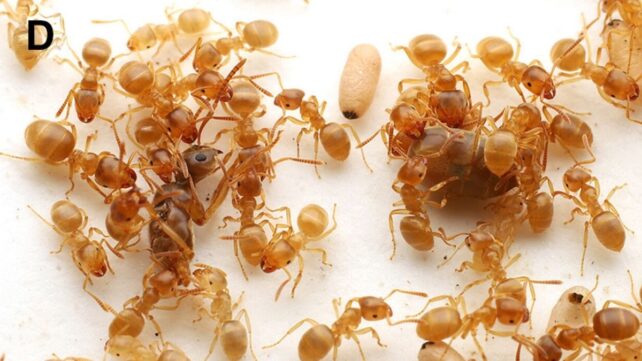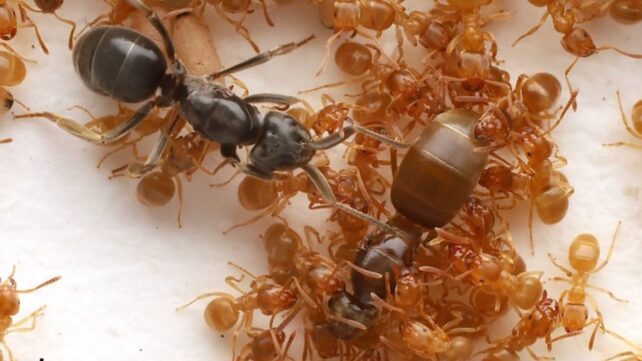While animal mothers are known to sometimes dispatch of their young, very few animals will kill their own mother: the care she gives is just too valuable. But it turns out some ants can be tricked into matricide, killing their own queen, and scientists have captured the chilling coup on video.
This insurrection is orchestrated by an outsider ant – a parasitic queen from either the Lasius orientalis or L. umbratus species, who sneaks into a colony of L. flavus or L. japonicus ants before wreaking havoc.
Related: Ant Queens Produce Offspring of Two Different Species, Stunning Scientists
"Ants live in the world of odors," says corresponding author and behavioral ecologist Keizo Takasuka of Kyushu University in Japan. "Before infiltrating the nest, the parasitic queen stealthily acquires the colony's odor on her body from workers walking outside so that she is not recognized as the enemy."
Once she is within the bowels of the colony, the parasitic ant attacks the resident queen by repeatedly spraying jets of fluid from an opening called an acidopore. Based on the parasite's genus and method of fluid deployment, Takasuka and team suspect the spray is formic acid.

"The parasitic ants exploit that ability to recognize odors, we believe, by spraying formic acid to disguise the queen's normal scent with a repugnant one. This causes the daughters, who normally protected their queen mother, to attack her as an enemy," Takasuka says.

The parasite makes a quick, but temporary getaway from the scene of the crime, in case any traces of formic acid remain on her.
"She [the parasitic queen] knows the odor of formic acid is very dangerous, because if host workers perceive the odor they would immediately attack her as well," Takasuka says.
The parasite will repeat this behavior as many times as necessary, until the resident queen is dead. Then, in the power vacuum left behind, she will begin laying eggs of her own, assuming reign over the colony. The workers, surprisingly, accept the new regime, tending to the parasite's eggs and their new matriarch.
It's another example of the kind of deadly intrigue that regularly plays out on the scale of insects all around us.
The research is published in Current Biology.

